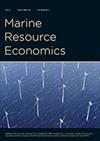Musings on a Career in Applied Fisheries Economics Research
IF 1.7
3区 经济学
Q2 ECONOMICS
引用次数: 0
Abstract
This paper chronicles my fisheries compliance and enforcement research during the past 40 years. My colleagues and I at the University of Rhode Island began researching fisheries law enforcement issues around 1980 because of the high degree of noncompliance in fisheries managed by the New England Fisheries Management Council. We collected data and demonstrated that the pure deterrence model does not explain fisheries compliance behavior well. This set us on a course to develop an enriched model of compliance behavior. The formal enriched model accounts for tangible and intangible motivations influencing individuals’ compliance decisions, resulting in better explanations of the evidence than the pure deterrence model. The model also provides practical and superior policy prescriptions. Although the enriched model is superior to the basic pure deterrence model, much research remains to be done on explaining compliance behavior and crafting more efficient and effective compliance and regulatory programs in fisheries.从事应用渔业经济学研究的几点思考
本文记录了我在过去40年中对渔业合规和执法的研究。1980年左右,我和罗德岛大学的同事们开始研究渔业执法问题,因为新英格兰渔业管理委员会管理的渔业存在高度的违规行为。我们收集了数据并证明,纯粹的威慑模型并不能很好地解释渔业合规行为。这使我们走上了开发丰富的合规行为模型的道路。形式丰富的模型考虑了影响个人合规决策的有形和无形动机,从而比纯粹的威慑模型更好地解释了证据。该模型还提供了实用且优越的政策处方。尽管强化模型优于基本的纯威慑模型,但在解释遵守行为以及制定更高效、更有效的渔业遵守和监管计划方面,仍有许多研究要做。
本文章由计算机程序翻译,如有差异,请以英文原文为准。
求助全文
约1分钟内获得全文
求助全文
来源期刊

Marine Resource Economics
农林科学-渔业
CiteScore
4.30
自引率
10.30%
发文量
25
审稿时长
>12 weeks
期刊介绍:
Marine Resource Economics (MRE) publishes creative and scholarly economic analyses of a range of issues related to natural resource use in the global marine environment. The scope of the journal includes conceptual and empirical investigations aimed at addressing real-world oceans and coastal policy problems. Examples include studies of fisheries, aquaculture, seafood marketing and trade, marine biodiversity, marine and coastal recreation, marine pollution, offshore oil and gas, seabed mining, renewable ocean energy sources, marine transportation, coastal land use and climate adaptation, and management of estuaries and watersheds.
 求助内容:
求助内容: 应助结果提醒方式:
应助结果提醒方式:


